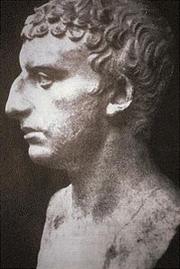Flabiou Iosepou Ierosolumitou hiereos Ta heuriskomena =
Status
Rate
Check Later
Subjects
Places
Times
This book, “FLAVII JOSEPHI HIEROSOLYMITANI SACERDOTIS Opera quæ exstant,” (“The Complete Extant Works of Flavius Josephus, Jerusalem Priest”), printed in 1611, is a Greek-Latin edition of the writings of the critically important Jewish-Roman historian, Flavius Josephus. It encompasses two main sections: the “Antiquitates Judaicæ” (“Antiquities of the Jews”) in 20 books and the “De Bello Judaico” (“On the Jewish War”) in 7 books. Both of these works — and especially De Bello Judaico — are indispensable sources for historians and archæologists dealing with ancient Jewish and early Christian history. Except for the introductory material in Latin, the text of each page is divided into two columns. Josephus wrote in Greek, then the lingua franca of the eastern Roman Empire, and this Greek is printed in one of the columns, with a Latin translation by Rufinus Aquilejensis in the column alongside it. Translators into the Latin are: for the Antiquities, Sigismund Gelenius; for De Bello Judaico (to which is appended a biography of Josephus), Rufinus Aquilejensis; for Adversus Apionem (“Against Apion”), Rufinus emended by Gelenius; for De Macchabeis (“On the Maccabees”), Book I with a paraphrase, Erasmus of Rotterdam. This Greek-Latin edition is based on a revised collation of the Greek manuscripts of the Palatine Library. For the Latin and/or Greek aficionado, this work is a gold mine. The Latin translators were among the world’s foremost Latinists of their time, and their Latin is clear and elegantly written. We are quite fortunate to have internet access to this PDF file (which can also be downloaded to one’s own hard disk), since in both its Greek and its Latin we possess a historical masterpiece. To mention only one small passage (p. 961 of the PDF file, De Bello Judaico, Liber Septimus, Cap. XII, De prodigiis excidium Hierosolymæ præcedentibus et præsagiis, §§ A—E), on the awe-inspiring narrative about Jesus of Jerusalem (Jesus Hierosolymitanus), the work relates how, in Jerusalem four years before the Jewish revolt (i.e., about A.D. 73), a simple peasant named Jesus suddenly went mad and spent the next seven years wandering about the city, possessed by some unknown but ominous intelligence and crying out that Jerusalem was to be destroyed. Indeed, for those who can read Greek or Latin, Josephus’ works in either of these languages are gripping.
Seems like you haven't provided a review
Don't miss the opportunity to share your thoughts!
